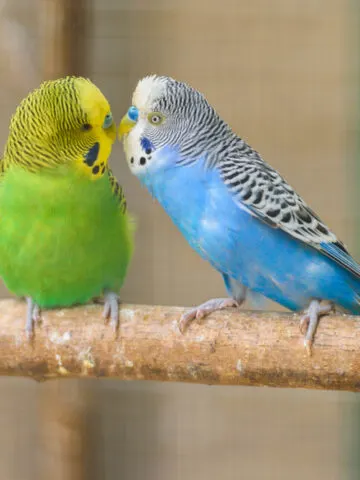Many know that in owning a parakeet, one will have a companion for years. In watching your parakeet, you can see that your feathered friend has some funny habits.
You may have seen them puff up and fluffy their feathers, and there is a reason for this.
Parakeets puff up for plenty of reasons, including that your bird is sleepy, chilly, upset, or sick. They may even puff up when you talk sweet to them and when they’re interacting with other birds.
It’s important to know your bird’s typical behaviors so you know when puffing up warrants a call to the vet.
In understanding your bird and their daily behaviors, you, as their owner, can pick up on certain habits. You may be able to tell when and why your bird puffs up and therefore know when it is a concern.
What Is My Parakeet Saying To Me?
Some birds have the gift of communicating by copying words, but mostly they use their body language and sounds.
To tell you, their owner, how they feel they use anything from head bobbing to singing. Those are tell-tale signs that your bird is happy or agitated.
It sure is cute to watch your bird puff and fluff their feathers to look like a fluffy puffball. Animals have to use their bodies to communicate.
When a bird puffs up, it can be to communicate something specific to you on how they feel.
Is It Time For Your Parakeet To Take A Nap?
Before you go to bed, you brush your teeth, wash your face, and put on clean pajamas. Do you see your parakeet cleaning, preening, and puffing their feathers up right before bedtime?
Puffing up may be a sign that they are ready to go to sleep.
Birds thrive on schedule and love when they know something is coming. Going to bed should be on their internal clock, and they know when it is time to go to sleep.
They will puff up and yawn to show you that they are ready for a good night’s rest.
Who doesn’t like to take a midday nap?
If you come home for lunch and see your bird puffed up, they may be ready for a nap. They will be hanging out in their favorite spot and puffed up just to get ready for a little siesta.
Your Parakeet Puffs Up Because They’re Cold
Parakeets are sensitive birds, and any draft can cause them not to feel well. If they get too cold, it can be detrimental to their health.
Parakeets will have signs to tell you they are too cold, like squawking or puffing up.
Puffing up is a way for your parakeet to conserve body warmth and energy. On colder days of the year, you will see your bird puff up to keep the warmth in their feathers.
So birds’ feathers fluff up to capture more air, and in doing so, they hold more heat.
That is why when your bird is cold, you may see them stay puffed up for an extended period. Parakeets puff up just as we wrap ourselves in a warm blanket; to get warm.
That may be a sign that you need to partially cover their cage or move them to a warmer spot.
Is Your Parakeet Puffing Up Because They’re Upset?
As stated before, parakeets have different ways of communicating their emotions. Puffing up can be a sign that your bird may be irritated by something. Your bird can sense things that you might not be able to see.
Keeping an on this body language can also be paired with others to tell you how upset they might be. If their tails twist and wings lift away from their body, this can be a sure sign of frustration.
Puffing up can look very healthy, but you should watch for any behavior change.
If you have other household pets intrigued by your bird, you may see your cat taking a swipe at your parakeet.
Cats can tend to agitate your bird, so your parakeet puffs up to look bigger. It may happen every time your cat enters the room, and this may be something to watch for.
Because birds are prey animals by nature, they are meant to hide how they feel.
In nature, they do not show how they may feel for such an apparent reason because it shows weakness. Your parakeet may try to hide it from you, but in watching your parakeet, you can pick up the signs.
Puffing And Sickness
Typically your parakeet is very active. You will begin to notice their quirky little behaviors, like how they act when you walk into the room.
Usually, when you approach them or try to pet them, they flatten their feathers tight to their bodies.
Puffing up and staying that way when you walk into the room may be a sign they are ill. Along with puffing, stuffy nose, and sticky poop may be a sign that your bird just isn’t feeling well.
Parakeets love external stimuli, and if your bird is puffed up and not reacting right, they need a vet.
As stated before, your bird puffs their feathers to trap more air to warm their bodies. When they are sick, they are generally cold and need to warm their bodies proficiently.
You might need to install a bird lamp when going to a vet is not available at the time.
Parakeets Puff Up When You Sweet Talk
Parakeets love and long for attention, and when they get it, they show you they are happy.
When you talk sweetly and softly to them, they puff up to show they are pleased to hear you talk. They are usually excited to be taken out, petted, and talked to.
Even soft music and commercials on television can cause your parakeet to puff up. They can close their eyes and push their head into yours as they fluff their feathers up to show comfort.
They puff up their way of showing they are happy to see you and hear you. Silence is almost deafening to them and can cause them stress.
It is essential to interact with your bird and talk to them to show them love. Also, when you’re not at home, they love soft music or a television on to stay content all day.
Puffing Up For A Friendly Companion
Parakeets are friendly birds and are usually in stores with companions. They love to be with other parakeets and their humans, and it can cause them to be a bit puffy.
They love to puff up and preen to impress their companions and owners.
It is common practice for other birds to preen and clean each other’s feathers. They puff up and shake to loosen debris and to make it easier to clean.
Using their beak to clean each feather, and when done, they puff and fluff to see how pretty they look. Even talking to the mirror, you may see your parakeet puffing up and licking it.
Parakeets are overly playful with their toys and mirrors, and you may see them puff up as they play. This excitement makes them puffy to show their love for playing just by themselves.
Your bird may even love your friendly feline and house-dwelling canine. Just seeing their furry companion can send your bird into a fluffy frenzy.
You may even see your calico and bird content with one another on your couch.
Related Questions
Will my Doberman get along with my parakeet?
In general, dogs are hunters, and they do love a good chase with a bird. Hunting dogs are a constant at catching and receiving ducks and birds.
Dobermans can be good hunters, and teaching them to get along with your bird may take time and patience. Teaching your Doberman to get along with your parakeet takes time for the introduction and correction.
Getting a puppy is best so you can raise them with their feathered companion and teach them how to behave. They can become the best of friends with proper time and training.
Why do parakeets bob their heads?
Head bobbing is a cute and entertaining motion that your parakeet does. Head-bobbing is also a way parakeets play with toys and entertain themselves.
Bobbing usually indicates excitement and happiness, and you can often teach your parakeet to do this when they hear music.
Males also head-bob as they try to entice and find a mate. Head bobbing is a dance-like movement, and it sure is cute to watch a male trying to attract their mate.
It is not uncommon to see your female parakeet doing it as it is a sign of affection.
Why do parakeets like the sound of running water?
Parakeets peep and chirp when they hear a sound that either displeases them or makes them happy. They are in tune with all the noises in your home and their surroundings.
Being in tune with sounds can help your bird to differentiate between sounds they like or dislike.
Water could mean, for them, a small bath, and they love to splash and dance in the water. They may also dislike the sound and chirp when they hear it to protest the sound of water.
Parakeets have a highly developed auditory system, and the sound your bird makes can tell you a lot.
Stacy is a lifelong animal lover who truly believes life just isn’t complete without pets. She’s had pets her whole life (including three dogs and a cat living under the same roof, somewhat harmoniously). She currently resides in NOLA with her husband, son, and two pups, Scooby “Dooby” Doo and Zoey. Stacy always makes a point to learn everything she can about her fur babies, and she has been writing about the pet-parent life for over two years.



Leave a comment
You must be logged in to post a comment.